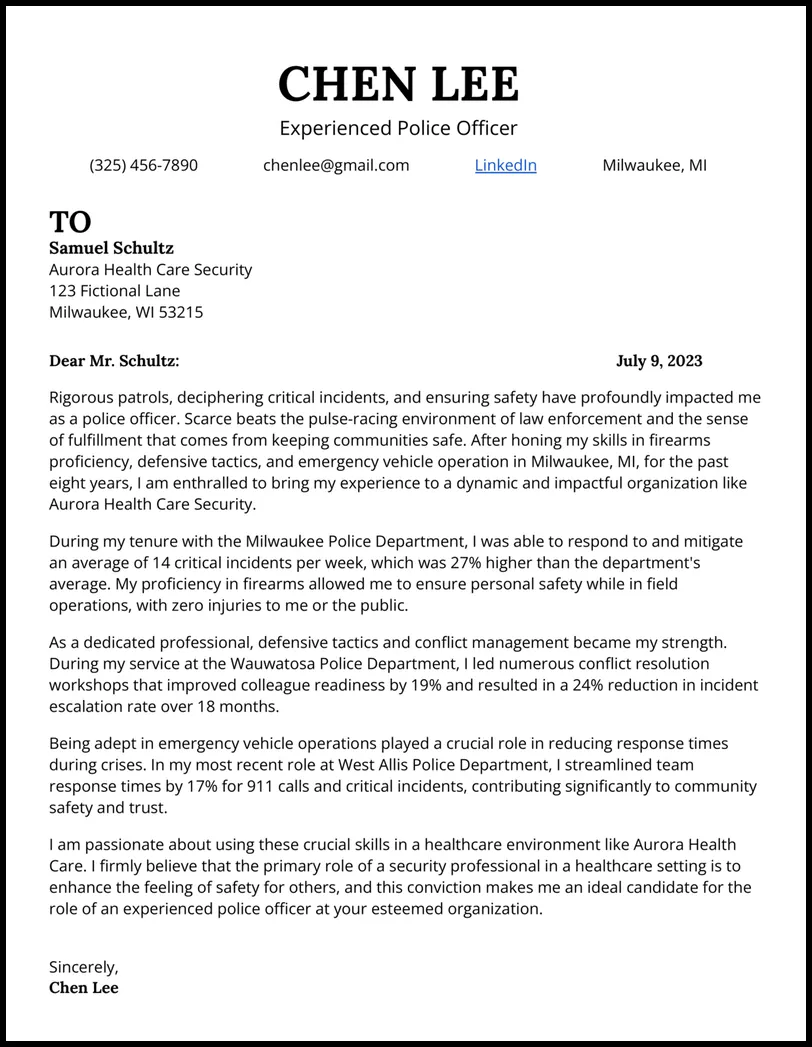Why a Detective Cover Letter is Crucial
A detective cover letter isn’t just a formality; it’s your first impression, a critical tool in your quest to land your dream job. In a field as competitive as law enforcement, especially for detective positions, you need to distinguish yourself from other applicants. Your resume provides a snapshot of your experience, but the cover letter offers a platform to showcase your personality, your passion for investigation, and your understanding of the role. It allows you to explain why you’re the perfect fit, connecting your skills and experience to the specific requirements of the job. A well-crafted cover letter demonstrates your attention to detail, your ability to communicate effectively, and your genuine interest in the position, increasing your chances of securing an interview significantly.
Understanding the Detective Role
Before writing your cover letter, it’s vital to understand the responsibilities of a detective. Detectives are responsible for investigating crimes, gathering evidence, interviewing witnesses and suspects, and building cases for prosecution. They must be meticulous, observant, and able to think critically under pressure. Detectives often work independently, managing their own caseloads, but also collaborate with other law enforcement professionals. They need to be proficient in various investigative techniques, including surveillance, interrogation, and evidence analysis. Furthermore, they must have a strong understanding of legal procedures and ethical standards. Showing your awareness of these aspects in your cover letter will demonstrate your preparedness and commitment to the role. This understanding is crucial as you tailor your letter to highlight skills that align with these requirements.
Skills to Highlight in Your Cover Letter
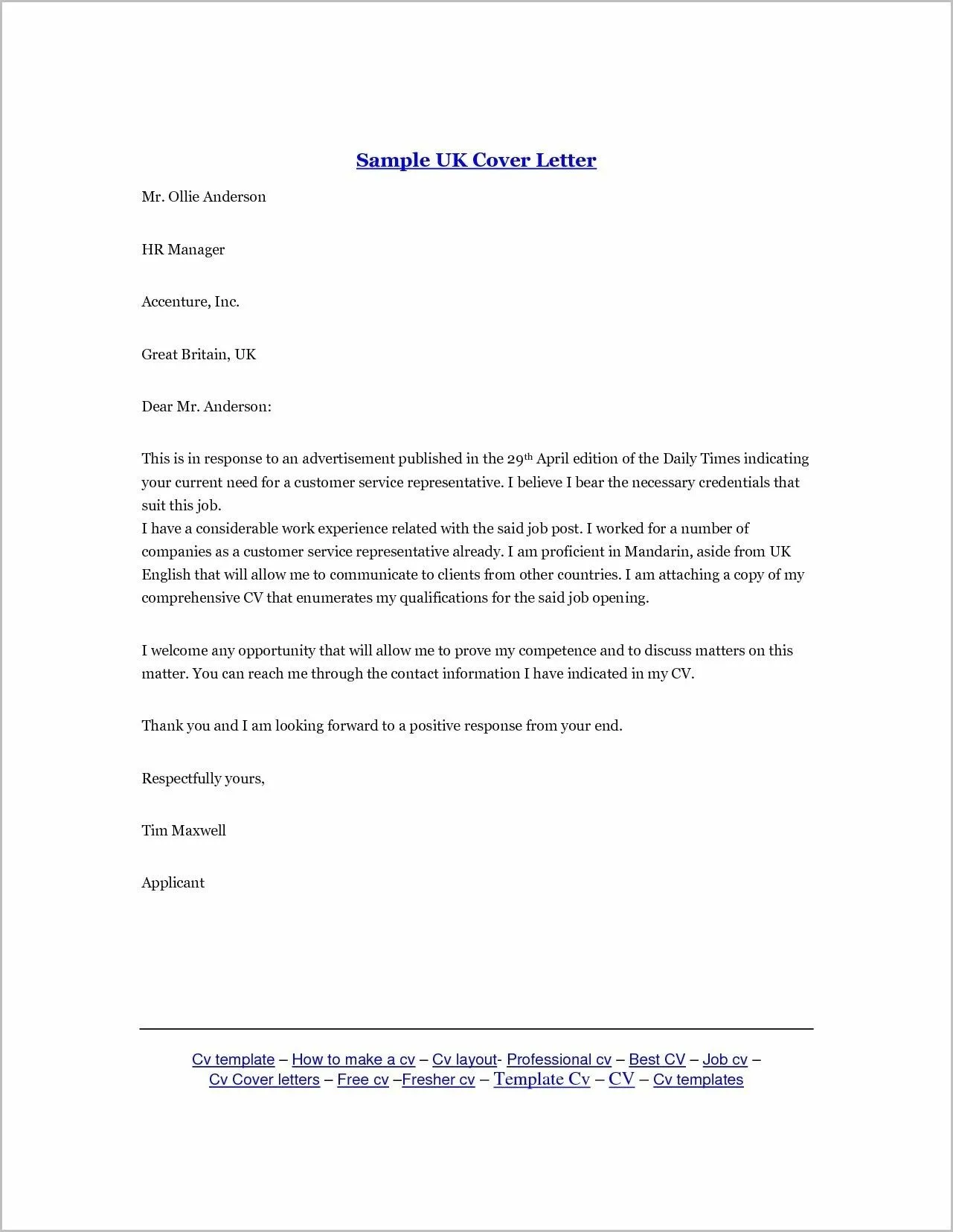
Your cover letter should spotlight the skills most relevant to a detective position. These skills are not just limited to investigation; they span across several critical areas of expertise. The hiring manager wants to see that you possess the abilities needed to solve complex cases, interact effectively with others, and make sound judgments. Highlighting these essential skills will capture the reader’s attention and reinforce your suitability for the role. Ensure that your skills are illustrated with specific examples from your past experiences, showcasing how you have applied them successfully. Be certain that each skill mentioned is relevant to the detective’s job to make your letter most impactful. In the next sections, we’ll delve into each skill to offer an in-depth view.
Investigative Skills
Investigative skills are the cornerstone of a detective’s effectiveness. These encompass the abilities to collect, analyze, and interpret information to solve crimes. Highlight your experience in conducting interviews, gathering evidence, and managing crime scenes. Detail your ability to identify leads, follow up on them, and piece together complex narratives. Any specialized training or certifications in investigative techniques, such as forensic science or surveillance, should be mentioned. Your cover letter should emphasize your capacity to think critically, evaluate evidence objectively, and make informed decisions based on the information available. Demonstrate your commitment to thoroughness and your dedication to pursuing justice through meticulous investigation. Show examples where your investigative skills have led to successful case resolutions, emphasizing how your skills directly contributed to positive outcomes.
Communication Skills
Effective communication is critical for a detective. You need to be able to communicate clearly and concisely, both verbally and in writing. Highlight your ability to interview witnesses, interrogate suspects, and write detailed reports. Mention any experience you have in public speaking or making presentations, as this can be beneficial. Your cover letter should showcase your ability to listen actively, understand different perspectives, and build rapport with others. Emphasize your interpersonal skills, such as empathy and the ability to remain calm under pressure. Provide examples of how you’ve used your communication skills to resolve conflicts, build trust, or persuade others. Showing your proficiency in communication ensures that you can collaborate effectively with colleagues, gather accurate information, and present your findings clearly.
Analytical Skills
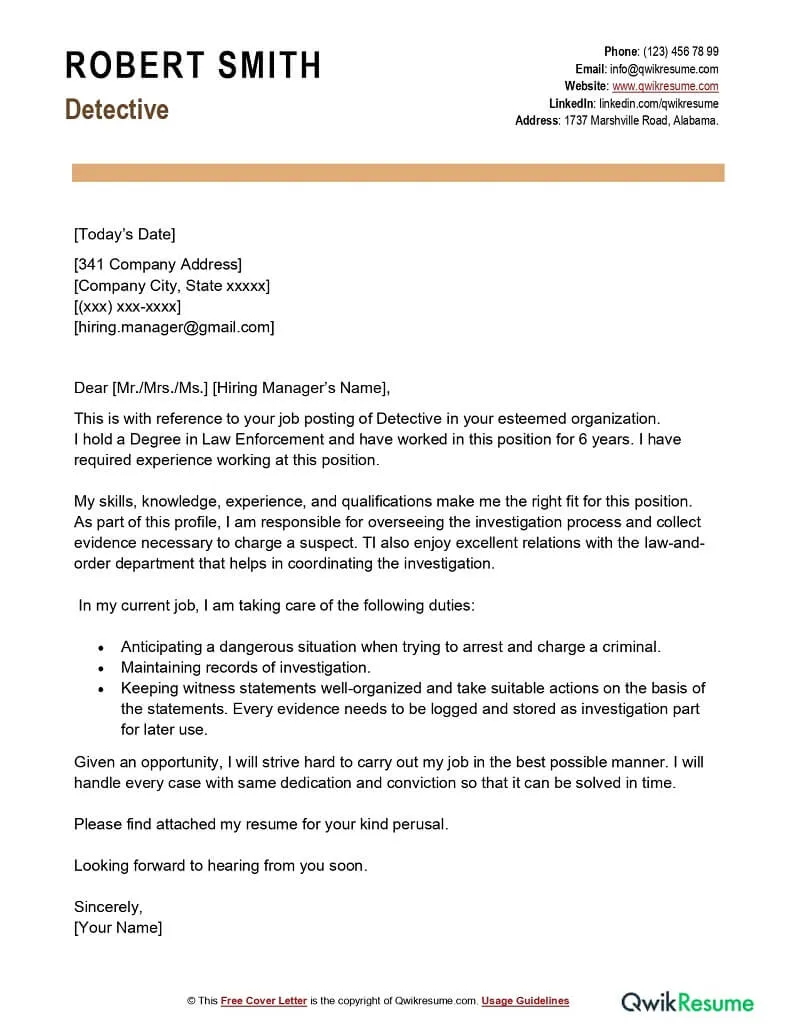
Analytical skills are essential for detectives, enabling them to examine complex information and identify patterns. Demonstrate your ability to analyze data, interpret evidence, and draw logical conclusions. Highlight your experience in using investigative tools, such as databases or forensic software. Your cover letter should showcase your ability to think critically, assess situations objectively, and make informed decisions. Provide examples of how you have used your analytical skills to solve problems or uncover hidden information. Emphasize your attention to detail and your capacity to see the bigger picture while examining minute details. Mention any relevant training in analytical techniques or data analysis that supports your abilities.
Problem-Solving Skills
Detectives are constantly faced with challenging problems that require creative solutions. Your cover letter should demonstrate your ability to think on your feet, find innovative solutions, and make quick decisions under pressure. Highlight your experience in assessing situations, identifying potential problems, and developing effective strategies. Mention any experience you have in working independently to solve complex issues. Your cover letter should showcase your ability to remain calm and focused during high-stress situations. Provide examples of how you have used your problem-solving skills to overcome obstacles or achieve positive outcomes. By highlighting these skills, you demonstrate your readiness to tackle complex investigations effectively and efficiently.
Experience Section
The experience section of your cover letter is where you demonstrate your qualifications for the detective position. This is not just a summary of your resume; it’s an opportunity to provide in-depth explanations. Focus on the most relevant experiences, highlighting your accomplishments and responsibilities. Include details about the types of cases you’ve handled, the techniques you’ve used, and the results you’ve achieved. Quantify your achievements whenever possible, such as the number of cases solved, the reduction in crime rates, or the successful apprehension of suspects. Emphasize experiences that align with the specific requirements of the detective position, showcasing your ability to handle the responsibilities of the role effectively. Explain your approach to work and provide evidence, using concrete examples, of your experience with investigations.
Showcasing Relevant Experience
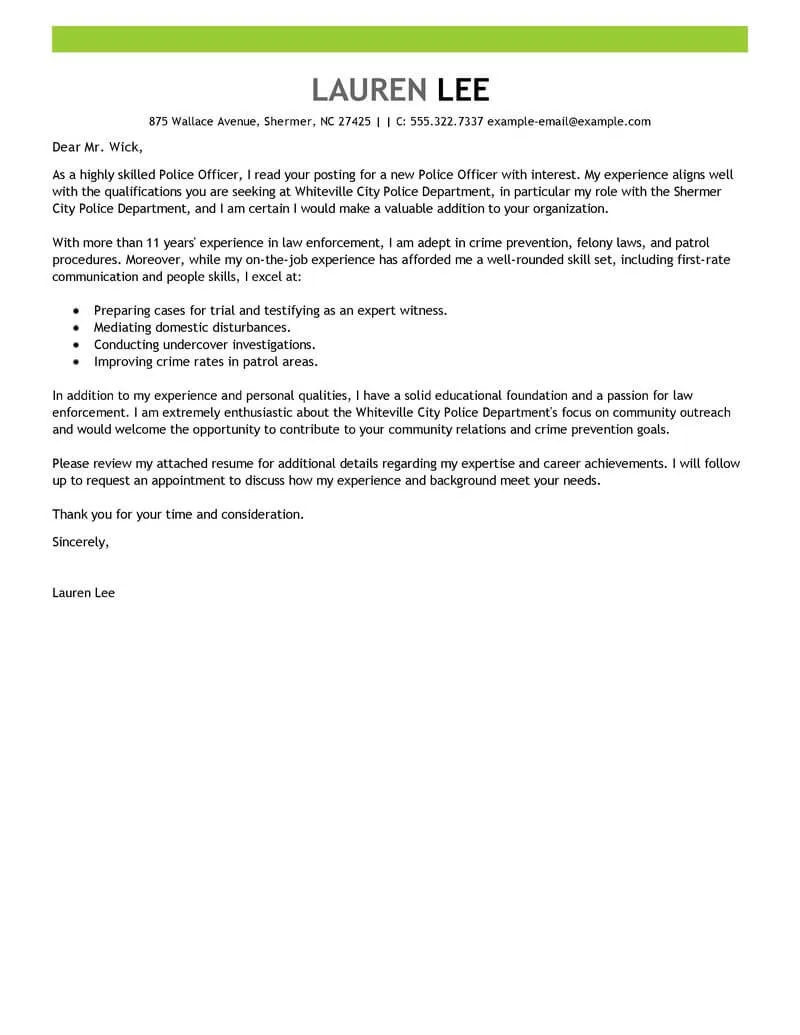
When showcasing your experience, focus on the tasks and accomplishments most relevant to a detective position. Detail your involvement in investigations, including the types of cases you’ve worked on, such as homicide, fraud, or cybercrime. Describe your experience in collecting evidence, interviewing witnesses, and analyzing data. Mention any experience you have with surveillance, interrogation, or other specialized techniques. Provide specific examples of how you’ve successfully solved cases or contributed to the apprehension of suspects. Highlight any certifications or training that are relevant to the position, such as forensic science or crime scene investigation. Ensure your examples are clear, concise, and demonstrate your ability to handle the responsibilities of a detective.
Tailoring Your Letter to the Job
Tailoring your cover letter to each job application significantly increases your chances of success. Review the job description carefully, paying close attention to the specific requirements and qualifications. Use the job description as a guide to highlight the skills and experiences that are most relevant to the position. Customize your cover letter to reflect the specific needs of the hiring agency or department. Research the organization to understand its mission, values, and priorities. Demonstrate your understanding of the role and how your skills and experience align with the job’s specific requirements. By personalizing your letter, you show that you’ve taken the time to understand the position and are genuinely interested in the opportunity.
Highlighting Achievements
Highlighting your achievements is critical in making a strong impression. Instead of simply listing your responsibilities, focus on the results you’ve achieved. Quantify your accomplishments whenever possible, such as the number of cases solved, the reduction in crime rates, or the successful apprehension of suspects. Use the STAR method (Situation, Task, Action, Result) to provide context and detail for your achievements. For example, describe the situation, the task you were assigned, the actions you took, and the positive results you achieved. This approach provides concrete examples of your skills and abilities. Ensure that your achievements align with the requirements of the detective position, demonstrating your ability to contribute to the success of the team and the organization.
Cover Letter Structure
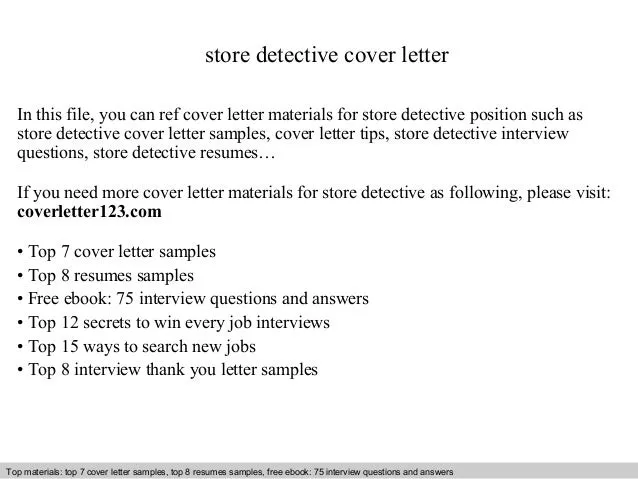
A well-structured cover letter is easy to read and effectively conveys your qualifications. Follow a standard structure, including an opening statement, body paragraphs, and a call to action. Each section should serve a specific purpose, highlighting your skills, experience, and interest in the position. Make sure that the structure is logical and organized, allowing the reader to easily understand your qualifications. Ensure the flow of ideas is smooth and that the writing is clear and concise. A well-structured letter reflects your professionalism and attention to detail, which are essential for a detective role. A good structure guides the reader effectively and helps them understand your key strengths and motivations for applying.
Opening Statement
The opening statement sets the tone for your cover letter and should immediately capture the reader’s attention. Start with a strong, concise statement that introduces you and states the specific position you’re applying for. Express your enthusiasm for the opportunity and your understanding of the organization. If you have a personal connection or a referral, mention it in the opening. Avoid generic phrases and instead focus on what makes you a good fit for the role. Clearly state your interest in the detective position and provide a brief overview of your most relevant qualifications. The opening paragraph should motivate the reader to continue reading and learn more about your background. This sets the right direction for the rest of your cover letter.
Body Paragraphs
The body paragraphs are the heart of your cover letter. Use these paragraphs to provide detailed information about your skills, experience, and qualifications. Organize your body paragraphs logically, addressing each of the key skills and requirements of the job. Provide specific examples of your accomplishments, using the STAR method to demonstrate your abilities. Connect your experience to the job’s requirements and highlight how your skills and experience align with the organization’s needs. Keep your paragraphs concise and focused, avoiding unnecessary jargon or overly lengthy sentences. Each paragraph should build upon the previous one, creating a cohesive and compelling narrative that showcases your suitability for the role. Ensure each point made is directly linked to the required skills and responsibilities of a detective.
Call to Action
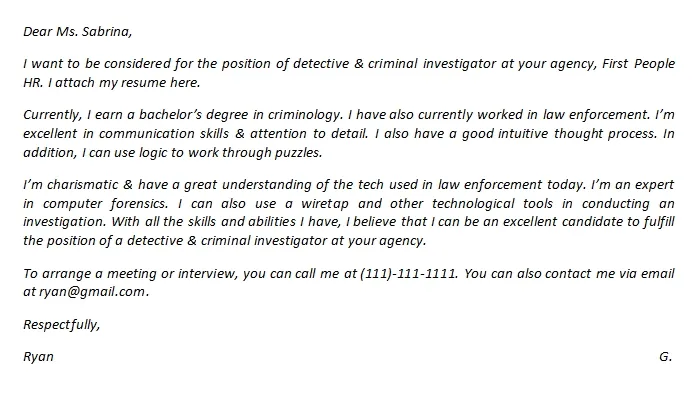
The call to action is the concluding paragraph of your cover letter. Summarize your interest in the position and reiterate your qualifications. Express your enthusiasm for the opportunity and your willingness to discuss your qualifications further. Thank the reader for their time and consideration. Include your contact information, such as your phone number and email address. Make it clear that you are available for an interview and eager to learn more about the position. A strong call to action leaves a lasting impression and encourages the hiring manager to contact you. This paragraph should reinforce the positive impression of your qualifications and make it easy for the hiring manager to take the next step.
Formatting and Proofreading
Formatting and proofreading are essential for creating a professional and polished cover letter. Use a standard font, such as Times New Roman or Arial, with a font size of 11 or 12 points. Use clear headings and subheadings to organize your content and make it easy to read. Keep your paragraphs concise and use bullet points to highlight key information. Proofread your letter carefully for any grammatical errors, spelling mistakes, or typos. Check your letter for clarity and ensure that your writing is easy to understand. Have someone else review your letter for accuracy and clarity. A well-formatted and error-free cover letter demonstrates your attention to detail and your commitment to professionalism, making a positive impact on the hiring manager.
Tips for a Strong Cover Letter
Here are some additional tips to help you create a strong cover letter. Research the organization and the specific position to tailor your letter to their needs. Highlight your most relevant skills and experiences, focusing on your accomplishments. Use action verbs to describe your responsibilities and achievements. Quantify your accomplishments whenever possible, providing concrete examples of your results. Show enthusiasm for the opportunity and your genuine interest in the detective position. Be professional, confident, and concise. Avoid using generic phrases and instead focus on what makes you a good fit for the role. Use a professional tone, keeping your language clear and direct. Proofread your letter carefully for any errors. By following these tips, you can create a cover letter that stands out from the competition.
Reviewing Your Cover Letter
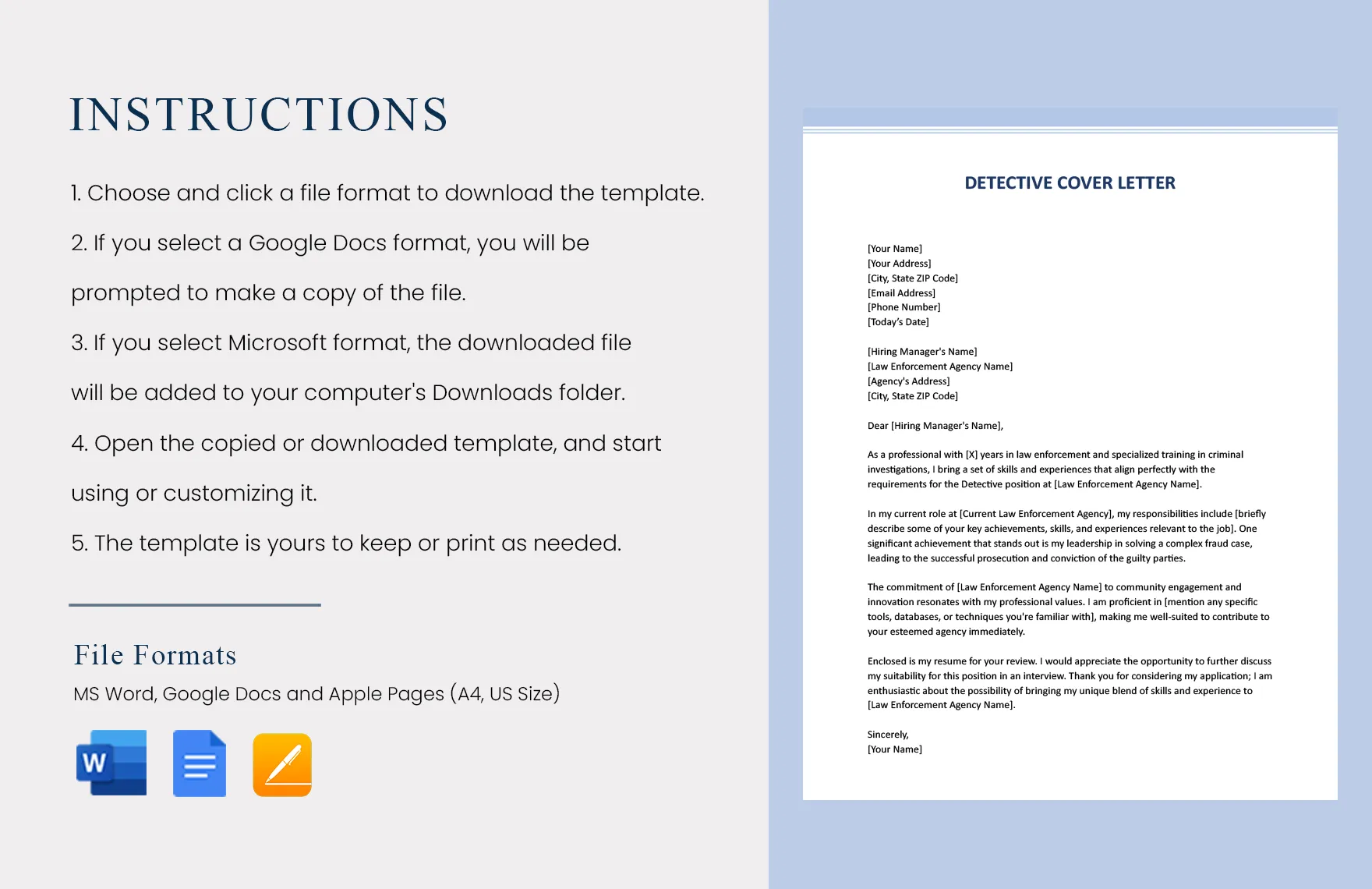
Before submitting your cover letter, it’s essential to review it carefully. Read it aloud to check for flow and clarity. Ask a friend, family member, or career counselor to review it for accuracy and feedback. Make sure your cover letter is free of errors and typos. Check that your formatting is consistent and professional. Ensure that your contact information is accurate and up-to-date. Verify that your cover letter is tailored to the specific job and organization. If possible, have a detective or law enforcement professional review your cover letter for content and relevance. Reviewing your cover letter one last time ensures that you present yourself in the best possible light and increases your chances of securing an interview.
Final Thoughts
Writing a compelling cover letter for a detective position is a crucial step in securing your dream job. By highlighting your skills, showcasing your experience, and tailoring your letter to the job’s specific requirements, you can significantly increase your chances of success. Remember to understand the detective role, emphasize your investigative, communication, analytical, and problem-solving skills. Follow a clear structure, and pay close attention to formatting and proofreading. Take the time to review and refine your letter before submitting it. With a well-crafted cover letter, you’ll be well on your way to a rewarding career as a detective. Good luck with your application!
